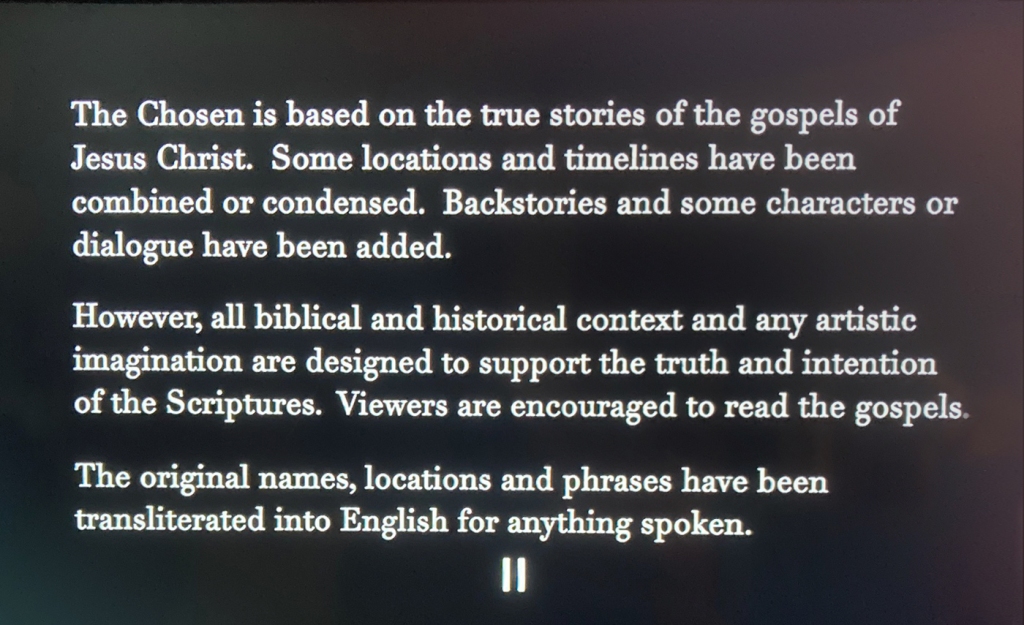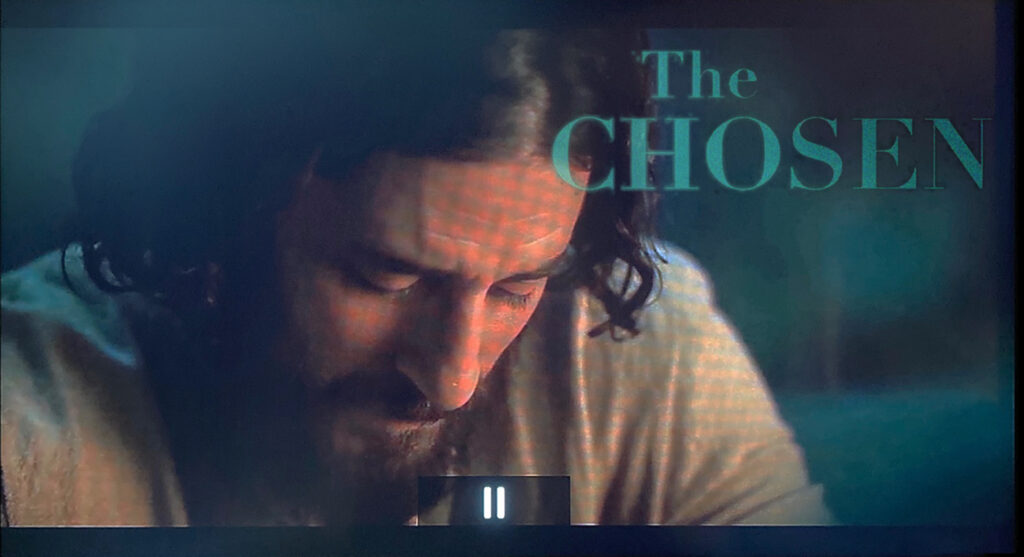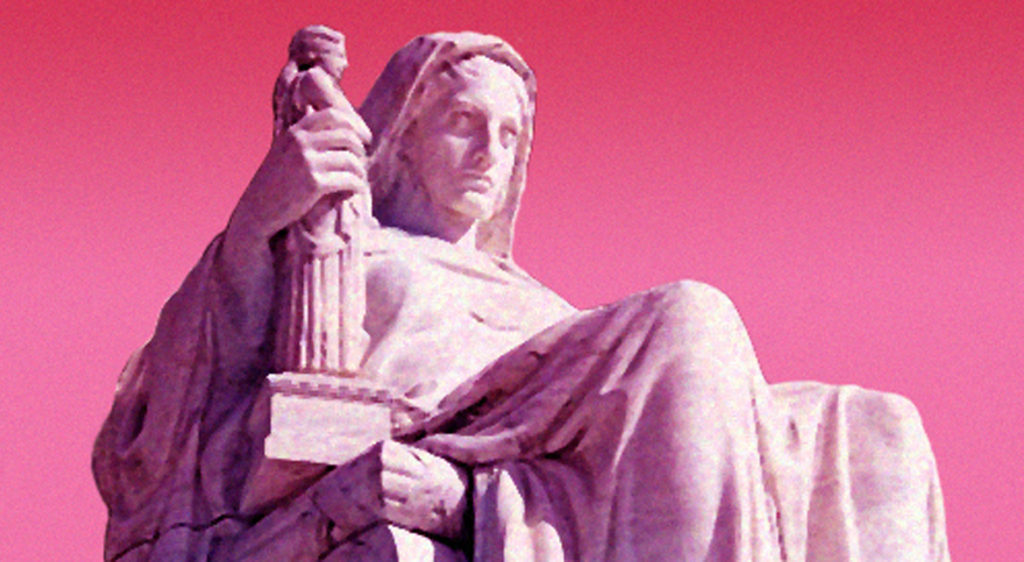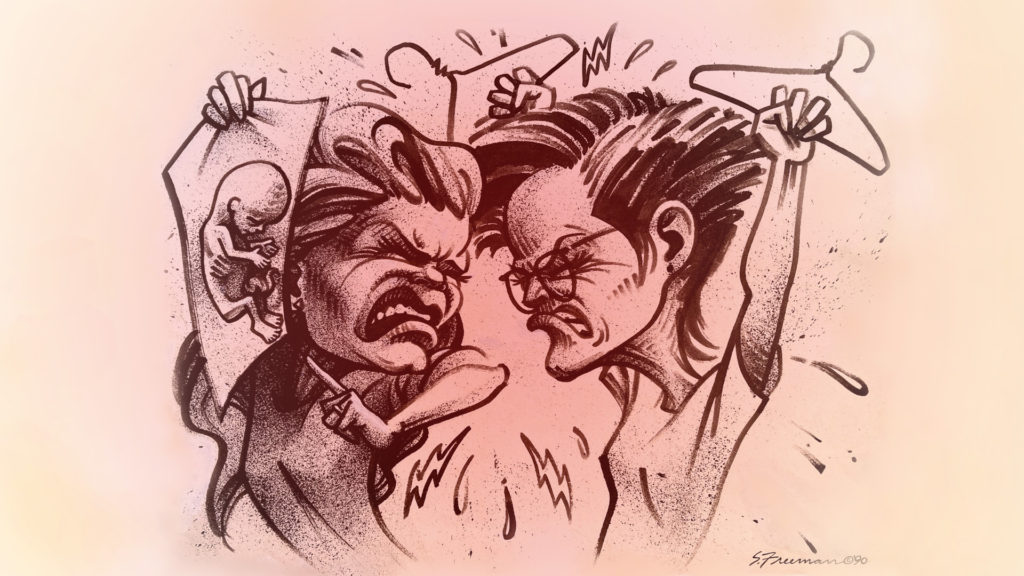Sometimes I am so disappointed with Evangelical subculture. There are some great things there, and in my opinion, one of the best things to come out of those two, dismal COVID years was Dallas Jenkins’s series about Jesus called The Chosen.
Apparently like many people, I didn’t have high expectations for The Chosen. That has changed. There are many things Jenkins and company really get right. A big one is that the writing team consults with a group of advisers from various backgrounds, including a Messianic Jewish rabbi. The fruit of this is good. The Chosen series feels very Jewish, as it should. It has been a conviction of mine for years that one cannot understand Jesus deeply without understanding the Jewish context in which He lived His earthly life.
Another aspect to love is the concept of character development. Some are now viewing this as a red flag – the concocting of “unbiblical” back-stories to fill in the gaps of the sparse biblical narrative. But friends, this is called historical fiction – creating plausible narratives that are informed by a culturally recognizable context, including both actual and made up events.
But is this a good idea? Is this taking liberty with the sacred text? I would assert that the writers are not taking liberties with the text. When the show’s dialogue intersects with actual biblical passages, the writers take care to remain true to what is written in the scriptures, and a biblically literate viewer is always able to recognize those passages. Here is a screenshot of the intro from episode one:

So why the back-stories? In my opinion, this is the genius of The Chosen. It is these fictitious back-stories that enable viewers to emotionally connect with the characters, so that when we do get to the scriptural words and actions of Jesus, they land on us in a more profound way.
The characters are unapologetically depicted as human and flawed, and we understand that something like what we’re seeing may very well have occurred that made the words and actions of Jesus more meaningful for them than we know. Think of the comfort and prestige of Nicodemas’s life and the tension that creates in him. Or Nathanael’s desire to glorify God, and his crisis of faith under the fig tree. Or Mary’s struggle with her past and with her self worth.
Every character is imagined with a unique story and personality. We can sympathize with them and their struggles. This is good storytelling.
To segue into the flag controversy, there is another aspect to love about The Chosen. We now know that Dallas and his wife have chosen to run their company in such a way that “there is no spiritual litmus test” for the people they employ. Furthermore they do not disallow personal expression within an employee’s personal space, nor do they attempt to monitor their employees’ social media accounts and personal lives. Consequently there is a diversity of opinions being expressed on and off the set. In Dallas’s words, “we discuss our differences in the context of relationship”… as a “family” To me that’s Spirit-informed thinking.
This diversity of viewpoints on the set showed up recently in a promo video for season four. An independent contractor had an American flag and a pride flag mounted on his camera, and the flags briefly appeared in the behind-the-scenes video. Fans were not pleased. Accusations have flown. Rumors have spread. Many have withdrawn support. Comparisons have been made to Target and Bud light. A boycott has been called for.
Director Dallas Jenkins responded with a 20 minute Youtube post, but the majority of people commenting are not satisfied. Within evangelicalism and conservatism there is currently a backlash to LGBTQ+ initiatives and not without good reason. Concerns run the gamut from the erasure of biological women, their opportunities, and their private spaces, to children being psychologically and even physically damaged by gender ideology. So a pride flag on a promo video for The Chosen is unacceptable for many fans, regardless of why it’s there.
So why was it there? Dallas claims they didn’t notice it. Perhaps because it’s something they see every day on set. But he stated clearly, “I don’t celebrate pride.” The Chosen did not “wave/promote the LGBTQ pride flag” as some claim. I appreciate his transparency regarding how he runs his business. I think letting us see the diversity behind the scenes is better than editing out the flag and projecting a false image of everyone on the set being a conservative evangelical. It’s also better than banning personal expression on the set and punishing non-compliance, as some are now advocating.
But what about the message that’s being sent in the promo video? It looks like The Chosen is advocating LGBTQ+ ideology! Well, you could certainly say that. You could also say that it looks like some of The Chosen employees support LGBTQ+ ideology. Which apparently is true. However, the message that’s being communicated through The Chosen is in the show itself, and Dallas Jenkins is in control of that. So far, I’m not seeing liberal theology or “progressive Christianity” being promoted. I’m seeing a biblically-based focus on the person of Jesus, and on His messiahship. And I’m hearing about a lot of good fruit.
I agree that the concerns around gender ideology are legit, but this is not about The Chosen leadership compromising their beliefs. It’s about their association. I think Jesus might have something to teach us about that, but it might not be what some Chosen fans are thinking. Critics charge, “but Jesus said, ‘go and sin no more.’” Note that the Pharisees said that too. What do you suppose the difference was? One difference I see is that Jesus “associated with the lowly.” He ate with “sinners and tax collectors.” He served and had significant associations with women, “unclean” people, Roman soldiers, prostitutes, Samaritan “half-breeds,” gentiles, the poor, and others with whom the Pharisees would not associate. He therefore had credibility with marginalized people.
Regarding LGBTQ people, the conservative Evangelical Church has generally done a poor job of treating them as valuable human beings created in God’s image. Our “pro-family” stance is not perceived as compassionate, and that is a problem. There are many gay people who do not subscribe to the activist LGBTQ agenda. There are people in, or formerly in, our churches who have unwanted same sex attractions, but don’t feel they can tell anyone. There are dysphoric young people who are vulnerable to the acceptance being held out by LGBTQ activists, while the pro- family majority doesn’t feel very welcoming.
There is an enormous amount cultural confusion around the issue of human sexuality now, spurred on by media’s repetition of progressive myths like, “sex is a spectrum,” and “gender is a social construct.” The church of Jesus should be a clarifying and compassionate voice in the culture, but often we repeat tropes and platitudes with an approach that is more political than spiritual. Instead of approaching our fellow travelers with friendship, compassion, understanding, science, and revelation, so many of us go barreling down the wide road of groupthink. The Chosen controversy is a case in point; the rushing-to-judgment, rumors, gossip, and factionalism contradict the way of Jesus.
In an entertainment industry that mostly runs the gamut from pointless to poisonous, Dallas Jenkins and company have brought something rich and redemptive to the world. I applaud them for that. I’ve had a couple of points of disagreement with some lines in the show. Disagreements are okay because Jenkins and company are making a good faith effort. You may disagree with my take here. I welcome that. But in the church of Jesus especially, we need to stop being so quick to divide.
The day may come when the actual message of The Chosen departs from the Scriptures and badly misrepresents the Jesus we know and love. For me, that day is not today. If and until that day comes, how astonishingly self-defeating it would be if this project were to grind to a halt because of the reactions of Christians. SMH.
The fruit of the righteous is a tree of life, And he who is wise wins souls
(Prov 11:30, NASB)
There is one who speaks rashly like the thrusts of a sword, But the tongue of the wise brings healing (Prov 12:18, NASB)
The heart of the wise makes his speech judicious and adds persuasiveness to his lips
(Prov 16:23, ESV)




